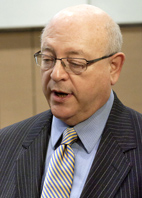SAN FRANCISCO “”mdash; Deep uncertainty hung over the UC Board of Regents meeting Wednesday at UC San Francisco.
Gov. Jerry Brown released a budget plan Monday that did not include additional reductions for the university beyond a $500 million cut already approved. But if the budget is not approved by the legislature, the cut to the UC could double.
Wednesday’s discussion revolved around future long-term funding of the UC system, which faces a possible revenue gap of more than $1 billion next year. Plenty of talking took place, but no decisions were made.
“The purpose (of this meeting) is really educational, for regents, media, students and faculty to see what our situation is,” UC President Mark Yudof said.
The regents heatedly debated topics such as fee increases and higher enrollment of non-California residents. Also, new topics such as differential tuition and the funding of private scholarships by business corporations were introduced as other ways to deal with the financial situation of the system.
“We need new and alternative resources, and we need to think big,” Yudof said.
The board was presented with four budget scenarios for long-term funding, all of which assumed an annual growth in state funds, tuition and enrollment. The annual increase in tuition in these scenarios ranged from an 8 percent increase with the help of state funds to a 20 percent increase if state funds were entirely cut off.
The latter would lead to a $23,100 tuition by 2015.
However, Nathan Brostrom, executive vice president for business operations, said these scenarios were only to present the board with possibilities, adding that students should not be concerned until a budget is approved by the legislature and a decision is made.
Two of the most contested issues of the meeting were differential tuition and the increased enrollment of out-of-state residents.
Differential tuition would charge higher tuition fees on a tier system which could be dependent on factors such as discipline of study, student level or campus. If a proposition like this passes, higher achieving campuses could be more expensive to attend.
Patrick Lenz, vice president of budget and capital resources, said this would need serious consideration from the board because it led to questions about student equality.
“If students are going to be promised that same experience, they should be expected to pay the same amount,” said Dan Simmons, faculty representative to the regents. “(Differential tuition) creates an expectation that high-priced campuses are better, and that expectation will become a reality.”
He added that it would lead the UC away from providing an equal education for all its students.
While some regents echoed Simmons’ thoughts, others like Sherry Lansing, next year’s chairman, said they were willing to entertain the option.
“I’m not for or against any of these,” Lansing said during the meeting. “But if we’re facing a billion-and-a-half-dollar reduction, I don’t want to be constantly looking at raising fees as the answer. … We have to look at everything.”
Regent Odessa Johnson said she opposed differential tuition because it would affect smaller campuses with large populations of underrepresented students.
A higher goal for enrollment of out-of-state students met disapproval from Regent David Crane.
“I’m very wary of this nonresident notion because if we talk about maintaining accessibility for Californians, then we need to do it with Californians,” Crane said.
Crane also called on the regents to be realistic about its financial situation and the support it expects to receive from the state. He said it hurt the university to rely on the state for funds and suggested the UC to “act more like a private university” to carry out its goals.
In a press conference after the meeting, Yudof and some of the regents expressed frustration with the state legislature for leaving them uncertain about the UC’s budget for the next fiscal year, which begins on July 1.
“We’d like to be where we should be, but tell us what the new reality is … so we can adjust to it,” Yudof said.
After much deliberation, the meeting ended with no clear proposal for long-term funding. The regents hope to approve a plan by the next meeting in July after they have had more time to consider the issues presented at the meeting.
“If you have a better plan I’m for it. There’s nothing locked in,” Yudof said.
